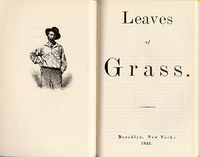Leaves of Grass: Difference between revisions
(Created page with "====Date: 1882==== ====Region: North America==== ====Subject: Racial/Ethnic,[[:Category:Sexual/Gender...") |
No edit summary |
||
| (7 intermediate revisions by one other user not shown) | |||
| Line 3: | Line 3: | ||
====Region: [[:Category:North America|North America]]==== | ====Region: [[:Category:North America|North America]]==== | ||
====Subject: [[:Category: | ====Subject: [[:Category:Political/Economic/Social Opinion|Political/Economic/Social Opinion]], [[:Category:Explicit Sexuality|Explicit Sexuality]], [[:Category:Sexual/Gender Orientation|Sexual/Gender Orientation]]==== | ||
====Medium: [[:Category: | ====Medium: [[:Category:Literature|Literature]]==== | ||
---- | ---- | ||
[[File: | [[File:Leaves_of_Grass_Book.jpg|right|200px]] | ||
'''Artist:''' Walt Whitman | '''Artist:''' Walt Whitman | ||
| Line 15: | Line 15: | ||
'''Dates of Action:''' 1882 | '''Dates of Action:''' 1882 | ||
'''Location:''' | '''Location:''' Boston, Massachusetts | ||
'''Description of Artwork:''' | '''Description of Artwork:''' Written by Walt Whitman, Leaves of Grass is a critically acclaimed collection of poetry. Although originally printed in 1855, Whitman continued to edit and revise the collection throughout his life. Some of his poems in the collection like, "Song of Myself, "I Sing the Body Electric" and "Pioneers, O Pioneers" have become enduring, celebratory anthems of Americana and are deeply embedded in the National psyche. Unlike other poetry of the time, which heavily employed allegory, symbolism and upheld religious and spiritual tropes, his poems predominantly engaged the body and the senses. | ||
'''The Incident:''' | '''The Incident:''' Oliver Stevens, the District Attorney for Boston in cooperation with the New England Society for the Suppression of Vice wrote to Whitman's publisher, James Osgood demanding that certain poems with pronounced allusions to sex and sexual preference, such as "Song of Myself", be revised and that certain poems such as "A Woman Waits for Me" and "To a Common Prostitute" be removed from the collection. He wrote, "We are of the opinion that this book is such a book as brings it within the provisions of the Public Statutes respecting obscene literature and suggest the propriety of withdrawing the same from circulation and suppressing the editions thereof." | ||
'''Results of Incident:''' | '''Results of Incident:''' Osgood asked Whitman to make the appropriate changes. He refused stating, "The list whole & several is rejected by me, & will not be thought of under any circumstances." Whitman went on to publish another edition of the collection later that same year with the direction of Rees Welsh & Company. The first printing of the new version sold out on its first day. | ||
'''Source:''' | '''Source:''' Loving, Jerome. Walt Whitman: The Song of Himself. University of California Press, 1999. | ||
[[Category: | "Revising Himself: Walt Whitman and Leaves of Grass (American Treasures Exhibition, Library of Congress)." Library of Congress. United States Government, 16 Aug. 2010. Web. 06 Dec. 2011. | ||
[[Category: | <http://www.loc.gov/exhibits/treasures/whitman-goodgraypoet.html>. | ||
[[Category: | |||
[[Category:1882]] | |||
[[Category:1800's]] | |||
[[Category:19th century]] | |||
[[Category:North America]] | [[Category:North America]] | ||
[[Category:United States]] | [[Category:United States]] | ||
[[Category: | [[Category:Political/Economic/Social Opinion]] | ||
[[Category:Explicit Sexuality]] | |||
[[Category:Sexual/Gender Orientation]] | [[Category:Sexual/Gender Orientation]] | ||
[[Category: | [[Category:Literature]] | ||
{{DISPLAYTITLE:<span style="font-style: italic;"> | {{DISPLAYTITLE:<span style="font-style: italic;">Leaves of Grass</span>}} | ||
__NOTOC__ | __NOTOC__ | ||
Latest revision as of 15:28, 2 December 2016
Date: 1882
Region: North America
Subject: Political/Economic/Social Opinion, Explicit Sexuality, Sexual/Gender Orientation
Medium: Literature
Artist: Walt Whitman
Confronting Bodies: Oliver Stevens, Boston District Attorney, New England Society for the Suppression of Vice, James R. Osgood
Dates of Action: 1882
Location: Boston, Massachusetts
Description of Artwork: Written by Walt Whitman, Leaves of Grass is a critically acclaimed collection of poetry. Although originally printed in 1855, Whitman continued to edit and revise the collection throughout his life. Some of his poems in the collection like, "Song of Myself, "I Sing the Body Electric" and "Pioneers, O Pioneers" have become enduring, celebratory anthems of Americana and are deeply embedded in the National psyche. Unlike other poetry of the time, which heavily employed allegory, symbolism and upheld religious and spiritual tropes, his poems predominantly engaged the body and the senses.
The Incident: Oliver Stevens, the District Attorney for Boston in cooperation with the New England Society for the Suppression of Vice wrote to Whitman's publisher, James Osgood demanding that certain poems with pronounced allusions to sex and sexual preference, such as "Song of Myself", be revised and that certain poems such as "A Woman Waits for Me" and "To a Common Prostitute" be removed from the collection. He wrote, "We are of the opinion that this book is such a book as brings it within the provisions of the Public Statutes respecting obscene literature and suggest the propriety of withdrawing the same from circulation and suppressing the editions thereof."
Results of Incident: Osgood asked Whitman to make the appropriate changes. He refused stating, "The list whole & several is rejected by me, & will not be thought of under any circumstances." Whitman went on to publish another edition of the collection later that same year with the direction of Rees Welsh & Company. The first printing of the new version sold out on its first day.
Source: Loving, Jerome. Walt Whitman: The Song of Himself. University of California Press, 1999.
"Revising Himself: Walt Whitman and Leaves of Grass (American Treasures Exhibition, Library of Congress)." Library of Congress. United States Government, 16 Aug. 2010. Web. 06 Dec. 2011. <http://www.loc.gov/exhibits/treasures/whitman-goodgraypoet.html>.
